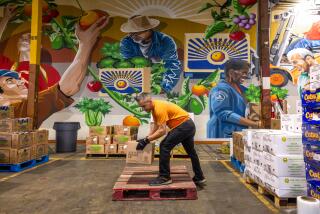Tennis marathon has serious aim: creating ‘political will to end hunger’
- Share via
It is Saturday evening in Duarte. On a comfortable, curvy street where bungalows line up behind neat, staked flower beds and RVs, the sharp dusk lights up signs backing this or that candidate for the school board.
Just the barest hint of fall chill wafts in through screen doors, and the sound of televised football games wafts out.
There’s a back-yard party at the Robinsons’, but it’s not your usual barbecue-and-booze thing. The menu runs more to vegetarian spaghetti sauce and Perrier, and it is a serious group of 35 or so that gathers on folding chairs around a large-screen TV wheeled out from the den.
To be sure, earlier there was a belly dancer (somebody’s daughter) to liven things up a bit, the ubiquitous camcorder is being thrashed about and beer has not been banished from the premises.
Still, these are people with more on their minds than social chitchat. How much more becomes apparent when somebody slips a tape into the VCR and, as Raul Julia narrates, the screen flickers with grim pictures of emaciated children and crude graphics showing money and food going toward the wrong side of the have/have-not equation on a world map.
The subject here is hunger. Not starvation, which comes from drought or famine and is acute and immediate, but hunger, the dull empty ache that never goes away.
More specifically, this evening’s subject is the Tennis Marathon to End Hunger on Our Planet, planned for Nov. 5 at the Whittier Narrows Tennis Center. People will pledge money to the grass-roots lobbying group Results--either a flat amount or so much for each hour that Richard Robinson plays.
Robinson thinks he can go 10. As the social-worker-turned-carpenter explains it, he wanted to do something and had read about fund-raising marathons but didn’t think his 47-year-old legs could take the running kind.
But he could play tennis, and he could ask friends and acquaintances to a pledge party. This will be his second year on the courts; last year, he raised $2,200.
Yes, the gray-bearded Robinson agrees, it does seem a bit like the 1960s revisited. Back then, though, he just protested. Now he wants to make a difference. That’s why, three times a month, he and Beverly D’Errico and three others meet in Diamond Bar to write letters to members of Congress and call editorial writers and do anything else they can to increase U.S. support for international loan and development efforts.
D’Errico is a 44-year-old housewife who got involved after seeing pictures of starving Ethiopians. She wanted to do something that would last longer than a handout.
“We get together and we practice what we’re going to say” to politicians, says Dorsey Lawson, a member of the Pasadena Results group as well as West Coast manager for the organization, which has 150 small groups worldwide, including two in the San Gabriel Valley. “Some people say that’s like kids in school, but we have fun doing it, and we get to where we’re saying, ‘Yeah, I can do something.’ ”
So that is why these people, ranging from an elderly woman with dainty white curls to Kris Hermes, a 25-year-old mechanical engineer and Results state coordinator, are here. “I don’t know that long-term (problems) are being solved on the basis of give, give, give,” Hermes says.
What it amounts to, says Sam Harris, a former music teacher who started Results nine years ago in Van Nuys, is a “little letter-writing group” seeking to coalesce “the political will to end hunger.”
And if wearing white shorts and whacking yellow balls in the sunshine to help people whose babies are dying seems almost a California caricature . . . well, as Margaret Mead said, never doubt that a small group of thoughtful citizens can change the world. Indeed, it’s the only way it’s ever been done.


